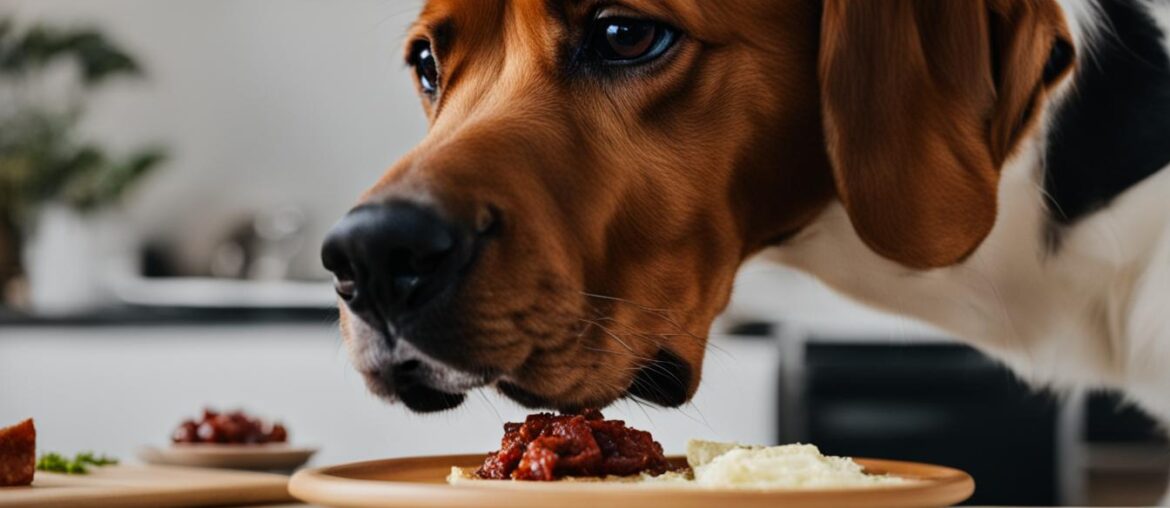Greetings! In this article, I’ll be discussing the safety of feeding chorizo to our furry friends, dogs. Many pet owners often wonder, can dogs eat chorizo? It’s important to understand the potential risks and health effects before considering chorizo as a treat for your canine companion. Let’s dive in and explore what you need to know about chorizo and dogs.
Key Takeaways:
- Chorizo is not recommended for dogs due to potential health risks and harmful ingredients.
- Ingredients like garlic, onion, and paprika found in chorizo can negatively impact a dog’s health.
- Feeding chorizo to dogs can lead to gastrointestinal issues and other serious conditions.
- Lean protein alternatives like chicken, turkey, or fish are safer options for dogs.
- Consulting with a veterinarian is crucial for personalized advice and guidance on your dog’s diet.
Why Is Chorizo Bad for Dogs?
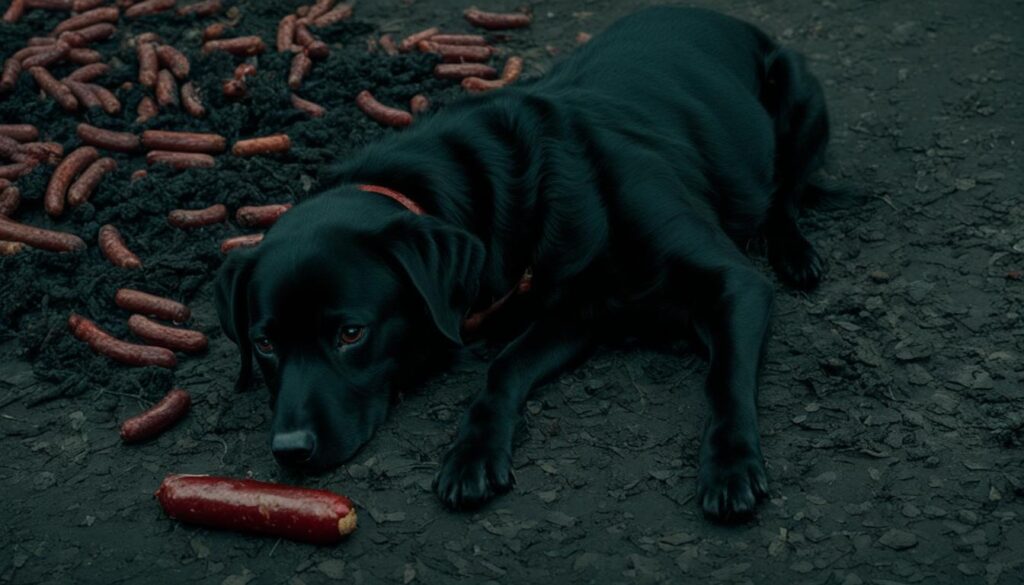
Chorizo contains harmful ingredients that can negatively affect the health of dogs. Ingredients like garlic, onion, and paprika can cause various issues in dogs, including gastrointestinal problems, anemia, pancreatitis, and allergic reactions. The high fat and sodium content in chorizo can also lead to obesity, digestive problems, and other health risks for dogs.
Garlic, one of the chorizo ingredients, can be toxic to dogs and cause damage to their red blood cells, potentially leading to anemia. Onion, another common ingredient, can also have harmful effects on dogs’ red blood cells. Additionally, paprika, which is often used in chorizo, can cause stomach issues and digestive discomfort in dogs.
Furthermore, the high fat and sodium content in chorizo can have serious consequences for dogs. Consuming chorizo can contribute to obesity in dogs, which can lead to various health issues such as diabetes, heart problems, and joint problems. The sodium content can also cause sodium overload, which can result in dehydration, electrolyte imbalances, and other health complications.
Chorizo contains ingredients such as garlic, onion, and paprika that are harmful to dogs. These ingredients can cause gastrointestinal issues, anemia, pancreatitis, and allergic reactions in dogs. The high fat and sodium content in chorizo can also lead to obesity, digestive problems, and other health issues in dogs.
Impact of Garlic, Onion, and Paprika on Dogs
The impact of garlic on dogs can be quite detrimental. Garlic can cause damage to dogs’ red blood cells, leading to anemia and potential health complications. Onion, similarly, can also affect dogs’ red blood cells and cause anemia. Both garlic and onion should be avoided in a dog’s diet.
Paprika, although not as toxic as garlic and onion, can still cause stomach issues and digestive discomfort in dogs. It can lead to gastrointestinal problems such as diarrhea, vomiting, and abdominal pain.
Due to these harmful ingredients and potential health risks, it is strongly advised to refrain from feeding chorizo to dogs. It is important to prioritize their well-being and choose healthier alternatives that are safe for their consumption.
Potential Risks and Side Effects
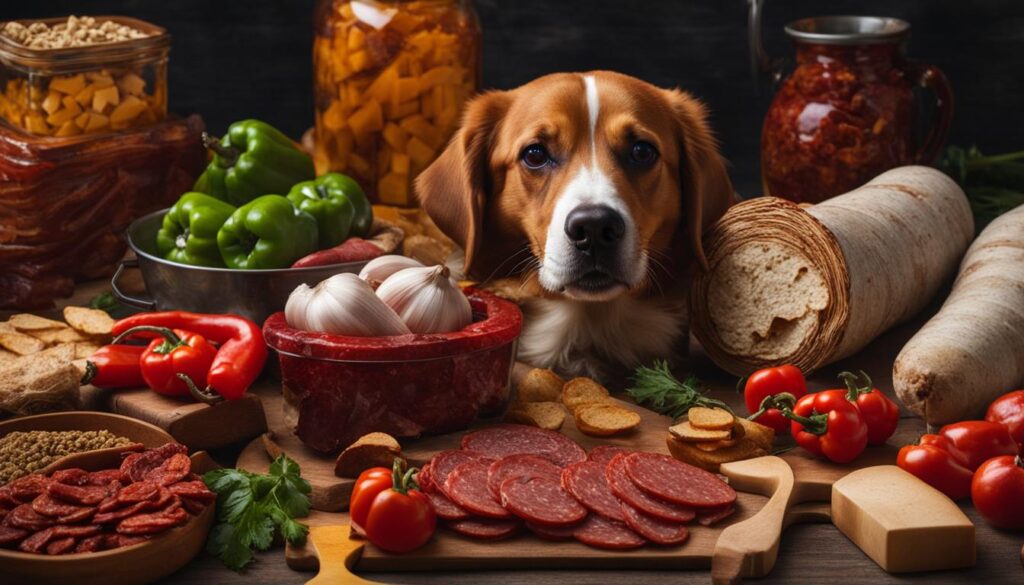
Dogs that consume chorizo may experience various potential risks and side effects. It is important for dog owners to be aware of these risks to ensure the well-being of their furry companions.
Gastrointestinal issues: One of the most common side effects of dogs eating chorizo is gastrointestinal distress. Dogs may experience diarrhea and vomiting, which can lead to dehydration and discomfort.
Pancreatitis: Chorizo is high in fat, which can trigger pancreatitis in dogs. Pancreatitis is a painful inflammation of the pancreas that can cause severe abdominal pain, loss of appetite, and other health complications.
Allergic reactions: Some dogs may be allergic to certain ingredients in chorizo. Allergic reactions can manifest as itching, skin rashes, swelling, and difficulty breathing. It is crucial to monitor dogs closely for any signs of allergic reactions if they consume chorizo.
Sodium overload: Chorizo contains a significant amount of sodium, which can lead to sodium overload in dogs. Excessive sodium intake can result in electrolyte imbalances, increased thirst, high blood pressure, and other serious health issues.
| Potential Risks and Side Effects of Dogs Eating Chorizo |
|---|
| Gastrointestinal issues (diarrhea, vomiting) |
| Pancreatitis (inflammation of the pancreas) |
| Allergic reactions (itching, skin rashes, swelling) |
| Sodium overload (electrolyte imbalances, increased thirst) |
Chorizo Alternatives Your Dog Can (Safely) Devour
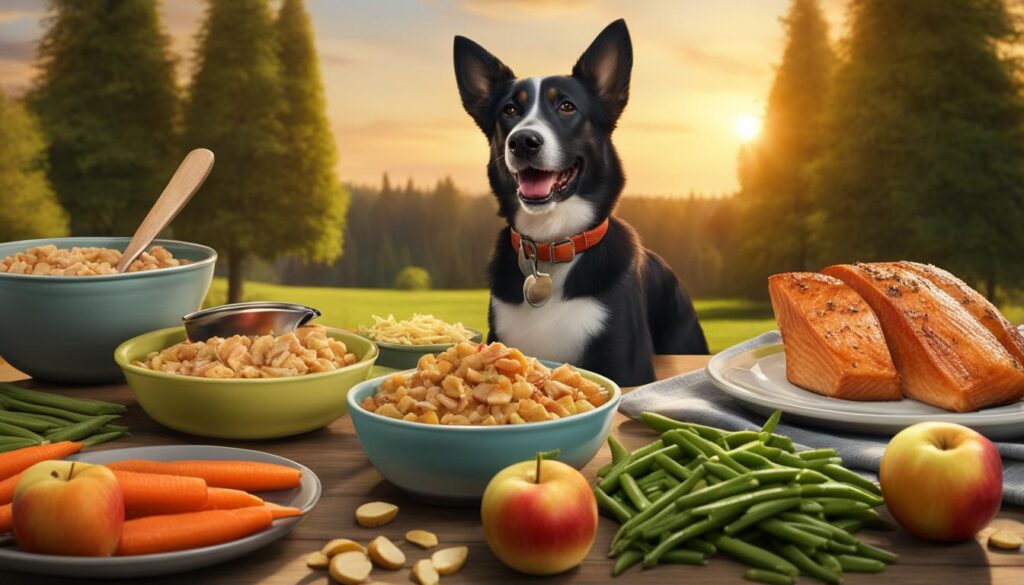
When it comes to feeding your dog, it’s important to choose safe alternatives to chorizo that provide nutritional benefits without the potential risks. Lean meats like chicken, turkey, and fish are excellent options that offer a good source of protein for your furry friend. These lean meats are low in fat and sodium, making them a healthier choice compared to chorizo.
Chicken is a popular choice for dog owners as it is easily digestible and packed with essential nutrients. Turkey, another lean meat option, is rich in vitamins and minerals that support overall canine health. Fish, such as salmon or sardines, contains omega-3 fatty acids that promote a healthy coat and skin for your dog.
In addition to lean meats, you can also enhance the flavor of your dog’s meals with dog-friendly spices. Turmeric, for example, has anti-inflammatory properties and can improve digestion. Parsley is another spice that is safe for dogs and can freshen their breath naturally.
By opting for these safe alternatives and incorporating dog-friendly spices, you can provide your dog with a tasty and nutritious diet that is free from the potential health risks associated with chorizo.
Consulting with a Veterinarian

When it comes to the health and well-being of your beloved dog, consulting with a veterinarian is of utmost importance. Regular check-ups with a veterinarian can help ensure that your dog receives the proper care and attention they need throughout their life.
A veterinarian can provide valuable guidance on various aspects of your dog’s health, including nutrition. They can recommend appropriate diets, portion sizes, and advise on any dietary restrictions or needs your dog may have. By consulting with a veterinarian, you can optimize your dog’s nutrition and contribute to their overall health and vitality.
In addition to nutrition, a veterinarian can guide you on the importance of exercise for dogs. They can advise on suitable exercise routines, taking into consideration your dog’s breed, age, and specific needs. Regular exercise is essential to maintain proper physical fitness and mental stimulation for your furry friend.
Vaccinations are another critical aspect of your dog’s health. A veterinarian can recommend the necessary vaccinations to ensure your dog is protected from common diseases. They can also provide advice on vaccine schedules and boosters to keep your dog’s immune system strong.
Behavioral issues can sometimes arise in dogs, and a veterinarian can offer valuable insights and solutions. Whether it’s excessive barking, separation anxiety, or aggression, consulting with a veterinarian can help address these behavioral issues and improve your dog’s well-being.
In case of emergencies, having an established relationship with a veterinarian is vital. Emergency care for dogs requires prompt and specialized attention. By consulting with a veterinarian and keeping them informed about your dog’s medical history, you can ensure that they receive the appropriate care in critical situations.
Remember, a veterinarian is a trusted partner in maintaining your dog’s health. They possess the expertise and knowledge to provide the best care for your furry friend. By consulting with a veterinarian, you demonstrate your commitment to your dog’s well-being and contribute to their long and happy life.
Can Dogs Eat Chorizo and Eggs?
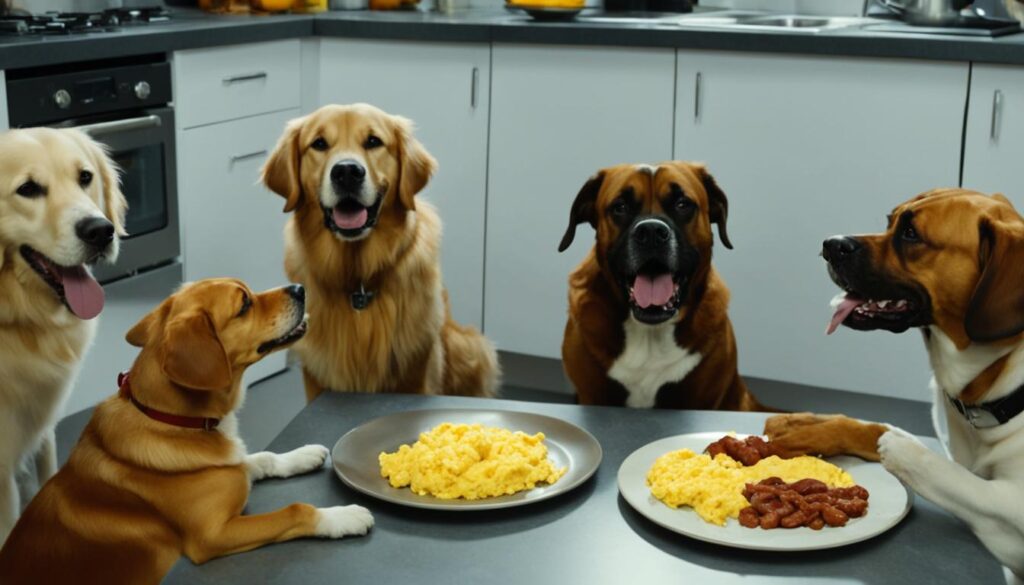
Feeding your furry friend a combination of chorizo and eggs is not recommended. This type of food is high in fat, which can lead to heart problems and other health issues in dogs. It’s best to avoid giving chorizo and eggs to your canine companion to ensure their well-being.
When it comes to the risks of feeding chorizo and eggs to dogs, the high fat content is a significant concern. Dogs are not well-equipped to handle a diet that is rich in fat, especially if consumed regularly. The excessive fat intake can put a strain on their cardiovascular system and increase the risk of heart problems.
Heart problems in dogs, such as heart disease and heart failure, can have serious consequences. They can result in symptoms like lethargy, difficulty breathing, excessive panting, and a reduced quality of life. Additionally, the high fat content in chorizo and eggs can contribute to weight gain and obesity in dogs, further exacerbating the risk of heart issues.
Potential Risks of Feeding Chorizo and Eggs to Dogs:
- Increased risk of heart problems
- Weight gain and obesity
- Potential digestive issues
Feeding dogs a diet that includes chorizo and eggs can have detrimental effects on their health, particularly their cardiovascular system. The high fat content in this combination can lead to heart problems that can significantly impact a dog’s well-being.
It’s important to prioritize your dog’s health and make informed choices about their diet. Instead of feeding them chorizo and eggs, opt for healthier alternatives that are low in fat and provide essential nutrients. Lean meats like chicken or turkey can be excellent choices for protein, and you can also incorporate dog-friendly vegetables and fruits to balance their diet.
Can Dogs Eat Chorizo and Potatoes?
Dogs should also avoid consuming chorizo and potatoes. This combination poses risks to their health due to the high fat content, which can increase the chances of developing heart disease and diabetes in dogs. It is crucial to prioritize their well-being and refrain from feeding them this type of food.
My Dog Ate Chorizo – What Do I Do?
If your dog ate chorizo, it is important to monitor them for signs of illness. Provide them with plenty of fresh water and watch for symptoms such as weakness, pale gums, rapid heart rate, muscle swelling, blood in the urine, seizures, and prolonged vomiting or diarrhea.
If any of these symptoms occur, it is recommended to contact a veterinarian for further guidance.
Chorizo Alternatives Your Dog Can (Safely) Devour
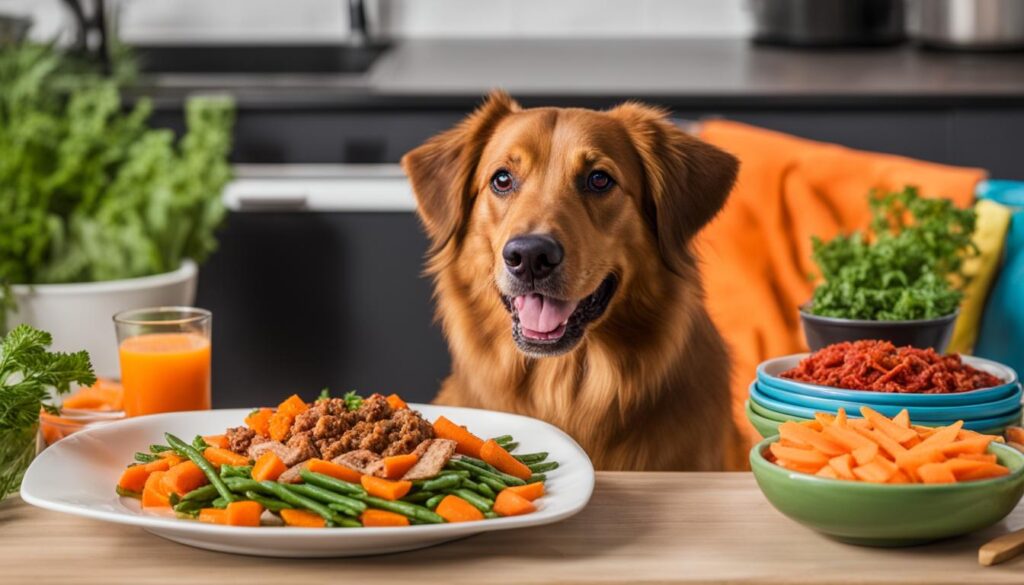
Even though dogs should not eat chorizo, there are safe alternatives that you can provide to your furry friend. One such alternative is cooked pork that is fully cooked without any seasonings or spices. Thoroughly cooked, unseasoned pork makes an excellent substitute for chorizo. It provides a good source of protein for your dog without the harmful ingredients and high fat and sodium content found in chorizo.
Another option to consider is pork-based dog treats. These treats are specifically formulated for dogs, ensuring that they are safe and healthy. Pork-based treats can provide a tasty reward for your pup while avoiding the potential risks associated with feeding them chorizo.
When feeding pork to your dog, it is important to do so in moderation. While pork can be a safe alternative to chorizo, it is still high in fat and should not make up the majority of your dog’s diet. It’s essential to maintain a balanced and nutritious diet for your furry companion. Additionally, always ensure that your dog has access to fresh water at all times.
By offering cooked pork and pork-based dog treats as alternatives, you can still provide your dog with delicious options without compromising their health and well-being.
Wrapping Up
In conclusion, it is not safe to feed chorizo to dogs. Chorizo contains harmful ingredients such as garlic, onion, and paprika that can negatively impact a dog’s health. These ingredients can cause anemia, digestive issues, pancreatitis, and allergic reactions. Additionally, chorizo has a high fat and sodium content, which can lead to obesity and other health problems in dogs. Instead of chorizo, it is recommended to provide dogs with lean meats such as chicken, turkey, or fish as safe alternatives.
Consulting with a veterinarian is crucial when it comes to your dog’s diet and overall health. A veterinarian can provide personalized advice based on your dog’s specific needs. They can guide you on the best dietary choices, vaccinations, exercise routines, and ways to address any behavioral issues. Remember, your dog’s well-being should always be a top priority.
In summary, while chorizo may be a popular food for humans, it is not suitable for dogs. Feeding chorizo to dogs can have detrimental effects on their health. Opting for safe alternatives and seeking professional guidance from a veterinarian ensures that your furry friend receives a nutritious and balanced diet, promoting their overall well-being and longevity.
FAQ
Can dogs eat chorizo?
No, dogs should not eat chorizo. The harmful ingredients, high fat and sodium content, and potential risks can negatively impact their health.
Why is chorizo bad for dogs?
Chorizo contains ingredients like garlic, onion, and paprika that are harmful to dogs. The high fat and sodium content can lead to obesity and other health issues.
What are the potential risks and side effects of dogs eating chorizo?
Dogs consuming chorizo may experience gastrointestinal issues, pancreatitis, allergic reactions, and other health problems due to the high fat and sodium content.
What are some safe alternatives to chorizo for dogs?
Lean meats such as chicken, turkey, and fish, as well as dog-friendly spices, are recommended alternatives to chorizo.
Why is it important to consult with a veterinarian?
Consulting with a veterinarian ensures personalized advice regarding your dog’s specific dietary needs, health condition, vaccinations, exercise, and behavioral issues.
Can dogs eat chorizo and eggs?
No, dogs should not eat chorizo and eggs as the high fat content in this combination can cause heart problems and other health issues.
Can dogs eat chorizo and potatoes?
No, dogs should not eat chorizo and potatoes as the high fat content in this combination can increase the risk of heart disease and diabetes.
My dog ate chorizo – what do I do?
It is important to monitor your dog for signs of illness and contact a veterinarian if they show symptoms such as weakness, pale gums, rapid heart rate, and prolonged vomiting or diarrhea.
Are there any safe alternatives to chorizo for dogs?
If cooked without seasonings or spices, pork can be safely provided to dogs. Pork-based dog treats are also a safe option in moderation.


